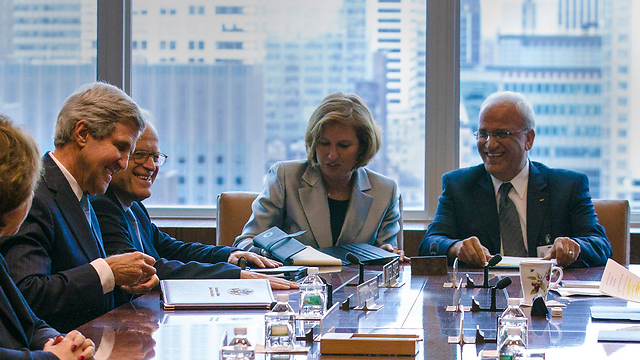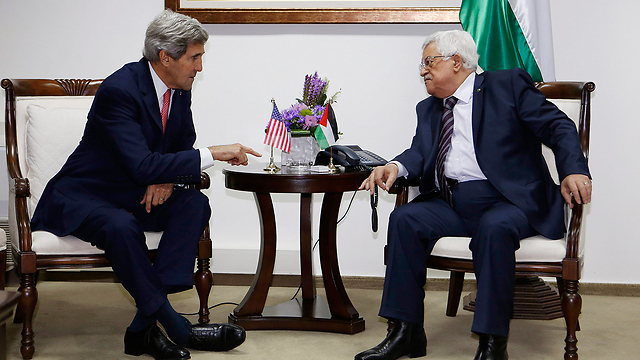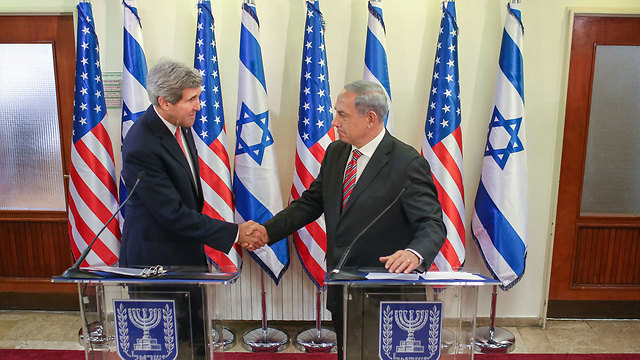
Source: Peace talks to extend beyond allocated nine months
Hours after Kerry leaves Israel, source tells Ynet that original nine month time-frame for talks will be extended, Kerry will assume larger role in bid to overcome obstacles which have left talks in deadlock
In light of difficulties plaguing the talks, the US, Israel and the Palestinians have begun to accept the fact that more time will be needed to overcome differences between the parties and reach an agreement.
Related stories:
- Kerry: Progress made in peace talks
- Kerry: Israel, Palestinians closest to peace 'in years'
- Abbas: Regardless of what happens, peace talks to continue
The source stressed that in addition to extending the time-frame for peace negotiations, Kerry will also dramatically increase his direct involvement in talks.
According to the source, Kerry will focus on bridging the gaps between the two sides on the core issues of the conflict, which have led to the deadlocked talks, and formulate an arbitration plan which he hopes will serve as an acceptable compromise.
Some two weeks ago, Palestinian President Mahmoud Abbas said the peace talks with Israel will continue for the full nine months as was originally agreed with Washington "regardless of what happens on the ground."
He further said that "We are committed and we will go to the full nine months, and then we will take the appropriate decision."
On Friday, US Secretary of State John Kerry closed another Middle East troubleshooting mission by urging Israel and the Palestinians to follow Nelson Mandela's lead and make peace.
The death on Thursday of Mandela, who fought apartheid in South Africa and became its first black president, was mourned across the globe, including by Israelis and Palestinians – the latter calling him an inspiration for their statehood struggle.
Before departing from Tel Aviv after a two-day visit to Israel and the Palestinian territories, Kerry quoted Mandela as having said, in the face of challenges, that "it always seems impossible until it is done".
"That example of Nelson Mandela is an example we all need to take to heart as we try to reach a two-state solution," Kerry told reporters.
On Thursday, Kerry said he presented Israel with "some thoughts" about improving its security under any eventual accord. Neither side detailed these, but Israel has long said it would want to keep a military presence between the West Bank and Jordan.
The Palestinians rejected Kerry's security proposals after he raised them with Abbas on Thursday, a Palestinian official told Reuters on condition of anonymity. The Palestinian peace negotiator, Saeb Erekat, denied that account but did not say what Kerry and Abbas had discussed.
After the meeting, Kerry commended Abbas for "his steadfast commitment to stay at the peace negotiations, despite the difficulties that he and the Palestinians have perceived in the process". Kerry said he might return to the region next week.
On Friday, he sounded more upbeat, saying: "I believe we are closer than we have been in years in bringing about the peace and prosperity and security that all the people in this region deserve and have been yearning for."
Kerry's peace mediation was overshadowed, in Israeli eyes, by his role in a the interim Geneva deal easing sanctions on Iran in return for some curbs on its disputed nuclear program.
An irate Prime Minister Benjamin Netanyahu blasted the agreement clinched in Geneva as a "historic mistake" that helped Tehran's limping economy while leaving it with the means to make a nuclear bomb.
In their three meetings this week, Kerry and Netanyahu took pains to reaffirm their friendship and said Israel and the United States would confer closely on keeping core sanctions against Iran in place while a final nuclear deal is crafted.
Kerry said on Friday that, thanks to the Geneva agreement, "I am personally convinced beyond any reasonable doubt that Israel is safer today ... We have stopped their (Iran's nuclear) program where it is."
Reuters contributed to this report
- Receive Ynetnews updates directly to your desktop














